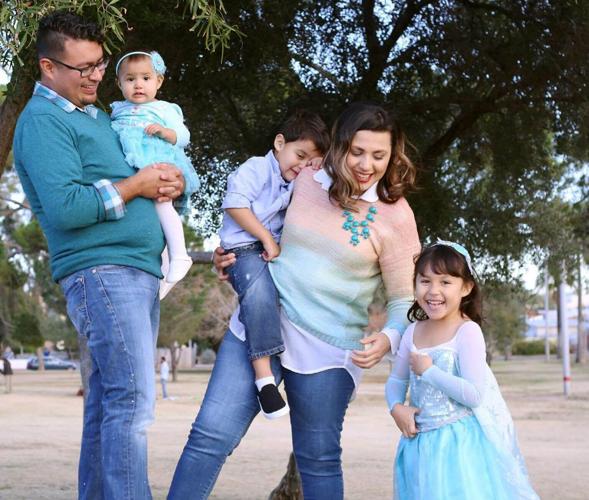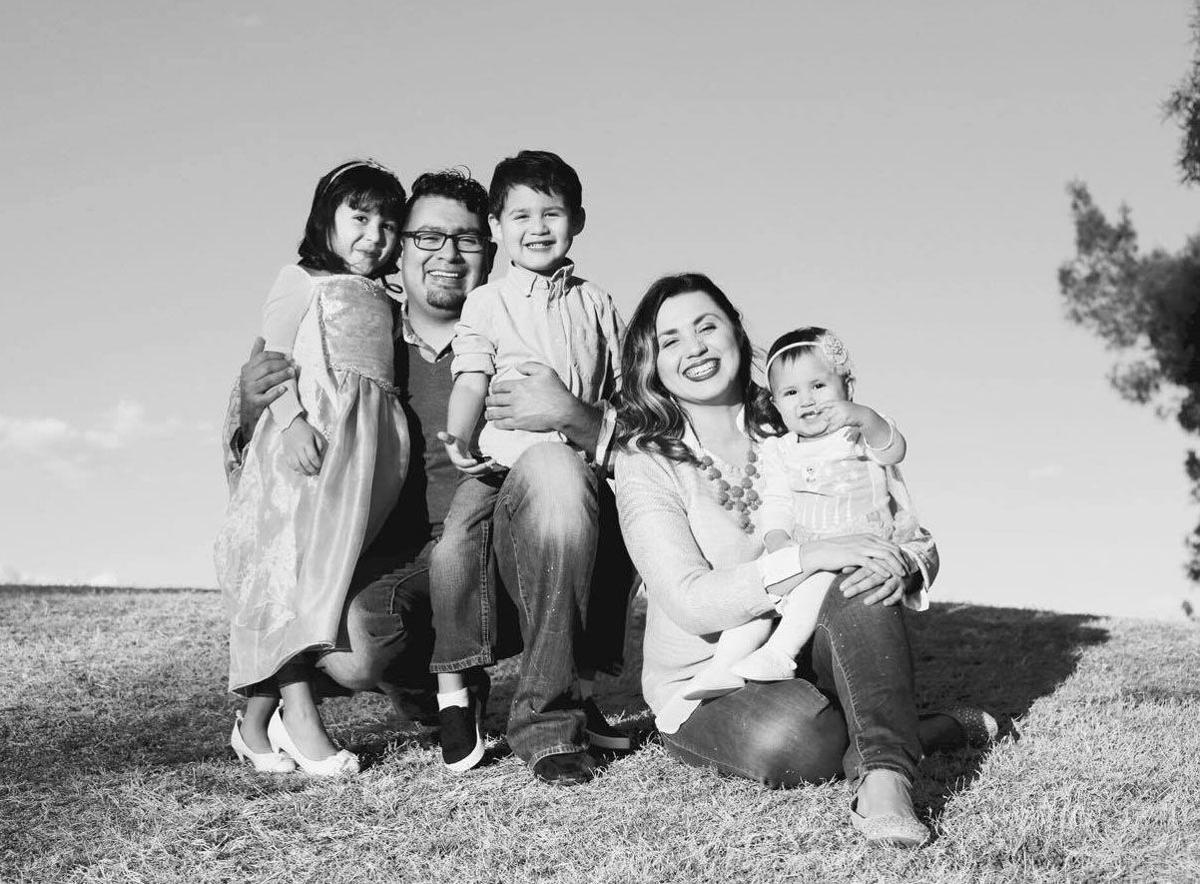When Cynthia Magallanes' 7-year-old daughter overheard her parents talking about the possibility of her mother having to move to Mexico, she had some questions.
"What are you talking about? Why would you have to go to Mexico?" she asked.
"So we had to have the conversation," Magallanes said. "It was very hard to have that conversation with her. It was heartbreaking. Her first reaction was 'Why would the president do that? I don't want to go to Mexico.' She started sobbing."

Cynthia Magallanes, 32, with her husband, Alex, and children, Galyah, 2, Caleb, 4 and Jazlynn, 7. Cynthia was brought to the United States as a four year old girl and considers this her country. Thanks to DACA, she was able to start a non-profit bridal store that provides services to survivors of sex abuse.
This is a discussion and a fear many families are facing now that the Trump administration has rescinded Deferred Action for Childhood Arrivals, or DACA, an immigration policy established by the Obama administration that protected eligible immigrant youth who came to the United States when they were children from deportation.
This protection, as well as the work permits and drivers licenses that came with it, were valid for two-year periods. Recipients could reapply at the end of the period.
Life here is all they know
For most of these DACA recipients, also known as dreamers, life in the United States is all they know.
"To me, this is my country," Magallanes said. "In high school I was in the ROTC and wanted to join the Marines but couldn't because I was undocumented. So, to me it was always about serving this country one way or another. So I have found ways."
Magallanes, who was brought here when she was 4 years old, runs a successful non-profit bridal shop, Free Ever After, that provides services to victims of sexual abuse. Thanks to DACA, she was able to start the non-profit in 2013.
"Every single survivor I have served has been a U.S. citizen," Magallanes said. "I've hired U.S. citizens. I consider myself a U.S. citizen."

Cynthia Magallanes, right, and Eveline O’Daly share a smile as they look at one of the dresses donated to Free Ever After, a nonprofit bridal resale boutique founded to help victims of sex trafficking.
Zaira Medina, a 16-year-old dreamer, has been in the United States since she was 5 years old.
"Everything. My whole family. Everything I know" is here, Medina said. "It scares me. Not only is DACA helping me, it's helping my mom. With the job I have I am able to hep take away some of her stress."
For Magallanes, this whole issue has caused her to feel like she doesn't belong anywhere.
"There was a moment where all I was doing was crying. I was like we're unwanted," Magallanes said. "The saddest thing is I could go to my birth country, but I wouldn't fit in there either. I don't know life there. It's so different. While I have some family still there, the life they have and the life I have are so different. I feel like I belong nowhere. I'm not from here and I'm not from there. ... It would be a complete traumatic experience.
"It's like, just let us have an opportunity to have the paper that says what we feel, that validates the years we've been here. That we don't have to be afraid."
Separating families
Dreamers who have children are forced to plan for the worst and think about whether they'd take the kids with them if they have to go back to Mexico or leave them here with spouses or other family who have legal status.
Kenia Beltran, a 27-year-old mother of one and psychology student, said she would have to leave her 5-year-old daughter with her husband if she was forced to leave.
Since her daughter is a U.S. citizen, she doesn't want to take away her opportunities, such as "access to a better education, healthcare" and the ability to apply for scholarships.

Kenia Beltran, 27, left, is one of 800,000 dreamers in the United States. If she is forced to leave, her daughter would stay with her husband in the U.S.
"I don't want to take that away from her by taking her to a country that I don't even know that well," Beltran said.
Beltran's husband has a permit and legal status to be in the U.S. and is on the waiting list for residency. He isn't allowed to leave the country until his residency is granted, so if she has to leave, she won't be able to see her husband.
"I do feel sad and scared," Beltran said. "It will be a huge change for us."
Magallanes said it would be better for her husband to stay and work here because income in the U.S. is a lot higher than in Mexico.
"So our family would have to be separated," Magallanes said. "I would leave my husband behind. And my children...One of them is on the spectrum. He receives special services that if we would have to move to Mexico, it's a whole different monster to tackle..."
They have discussed the possibility of their son staying with his father and the girls going with their mom.
But, "They don't speak Spanish. They're U.S. citizens," Magallanes said. "They would have to leave their country to go and wait for me.
"If it doesn't work that way, my husband would have to leave Arizona and go to New Mexico where we have family to get help with the kids while I'm away, meanwhile working to support two different households.
"The hardest thing for us to think about is the separation of my family."
Facing uncertainty, staying positive
President Trump has given Congress six months to create immigration legislation. During that time, the administration says DACA recipients are safe. Those with DACA who are reaching the end of their two-year period have until Oct. 5 to reapply. After that, applications will no longer be accepted.
One of the benefits of DACA was not having to being afraid, Magallanes said.
"Coming out of the shadows like 'oh my gosh, I'm free' and now we're going back to 'oh my gosh here comes that fear again,'" Magallanes said. "Here comes the uncertainty. That's the worst because it's like, yes we have six more months but what about after? Will they come to a middle ground? Even if they do something, it takes a long time to get the process going, so we're talking months and months, more than six months before something to be done. It's like do they revoke our DACA? Do they revoke our work permits? Mine expires in 2019, but after that, what happens?"
Despite that, families are trying to stay positive.
"I have faith we're going to get something better out of this," Beltran said.
"We're seeing a lot more people speak up for us. They're pushing Congress," Magallanes said. "I'm really hoping that they do something with it, that there will be a pathway to citizenship."
Tucson responds
After seeing response, both nationally and locally, Magallanes feels encouraged to see the support shown by others.
"I think it's so encouraging to see so many people rise up and defend us," Magallanes said. "It brings so much hope and peace to my heart to think there's more people for me than against me. I'm like, man, I am loved."

A sign showing support at a DACA rally earlier this week.
At a rally earlier this week, hundreds of people gathered and marched to Tucson City Hall to show their support for Tucson's dreamers.
"These are our children," said Fran Parker, 64, at the rally. "We need to take care of and protect them and keep them here, in the country they love."
Mireya Pedroza, a 19-year-old student carried a sign that said "We the people are all immigrants." She was there to support "her people."
"I'm here today because I'm supporting my people," Pedroza said. "I can't watch my friends and family have their rights taken away. Everybody has the right to move forward. I'm supporting the rights I wouldn't have if I wasn't born here."

Mireya Pedroza, 19, said that even if it wasn't directly effecting her, she was there to support her people.
What dreamers want you to know about them
"We want to work and be somebody. We don't want to be here and do nothing." ~ Zaira Medina, 16
"We're not taking anything from them. I paid for my own education. I don't get financial aid or welfare. I pay taxes." ~ Kenia Beltran, 27
"We're good people that want something better for us. A better future." ~ Jesus Torres, 21
"It's like, we are just like you. We love America just like you. We raise our children with the same values just like you. At times even more because we understand, I guess we don't take that for granted. Really take advantage of every opportunity you have as an American citizen. To join the military and to go to college.
"Look at us and view our humanity. We are not criminals. We cannot have felonies or we could not qualify. We do not get anything from the federal government. People think we are here to freeload. And honestly, I cannot get ACCHS. I pay for health insurance. I don't get food stamps. I don't get welfare. I do not get FAFSA. See that we love this country. This is all we know." ~ Cynthia Magallanes, 32









